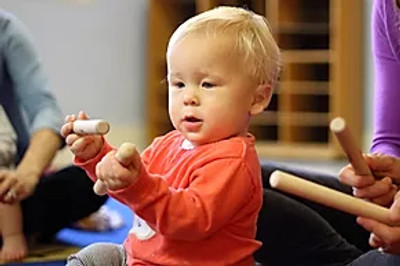Musical activities enhance baby's brain response to music and speech
Lisa Darmanie, Founder/Director Alabanza Music on 23rd Aug 2018

Rocking and bouncing to the music, singing and playing with instruments along with baby is such fun and a great bonding activity for the family, especially in a group setting and you may have wondered - How is this experience impacting on baby's brain?
A recent 2016 study by scientists at the University of Washington’s Institute for Learning & Brain Sciences (I-LABS) shows that a series of play sessions with music improved 9-month-old babies’ brain processing of both music and new speech sounds.
“Our study is the first in young babies to suggest that experiencing a rhythmic pattern in music can also improve the ability to detect and make predictions about rhythmic patterns in speech,” said lead author Christina Zhao, a postdoctoral researcher at I-LABS.
There has always been a direct correlation between rhythmic patterns in music and rhythmic patterns in speech and we see it when children chant nursery rhymes or simple poems effortlessly in rhyme. We knew it was important to integrate music and even foreign language within a social setting so the confirmation from this study is one to get you excited!
“This means that early, engaging musical experiences can have a more global effect on cognitive skills,” Zhao said.
“Infants experience a complex world in which sounds, lights and sensations vary constantly,” said co-author Patricia Kuhl, co-director of I-LABS. “The baby’s job is to recognize the patterns of activity and predict what’s going to happen next. Pattern perception is an important cognitive skill, and improving that ability early may have long-lasting effects on learning.”
Music and language are inextricably linked. Every language in itself has it's own rhythm, just like music so that the rhythmic patterns in phrases and the timing of it leads the listener to understand and this ability to distinguish differences in speech sounds is what helps babies learn to speak.
"In previous studies, infants who experienced social foreign language intervention during this period learned to detect changes in foreign speech sounds better than controls who did not have such foreign language experience". Further to that, the current study showed that "intervention in the music domain also affects foreign speech processing"

What does all of this mean? Well we can throw out those previously held notions that introducing your child to a foreign language from young causes delays in speech. In fact, introducing your child to a foreign language like Spanish in a social setting, can be very beneficial to baby's brain, allowing baby to start distinguishing differences in syllable and consonant sounds in the foreign language as compared to a child who would not have had that experience.
This study also supports why starting early with activities for language development through music is crucial during the infant stages in helping a child develop discriminatory skills and auditory acuity, not just when it comes to language in itself, but also patterns in music.

The intervention group exposed infants to music in triple meter (the waltz) in a social environment and the control group engaged in similar social play without music. Turns out that the infants who engaged in music activities "exhibited enhanced neural responses to temporal violations in both music and speech, in both auditory and prefrontal cortices"
Remember those instances in Musikgarten class we danced to the Emperor's Waltz, the Castilian "Parang" music in triple meter? Ever wondered why we would do so many activities in triple meter like singing and rocking to the Sea Shell song or rhythm patterns: du-da-de? Well, it's a matter of conditioning to get children accustomed to moving to triple meter as even the researchers knew that when compared to duple meter, it would be a little more challenging for babies to process. I've seen so many people struggle with triple meter. Why? It's all a matter of exposure.
Previous studies have demonstrated that infants can rapidly learn temporal patterns in the music of their culture. Across our Musikgarten curriculum and even moreso in our Music Makers Around the World class for primary schoolers, children are exposed to syncopated rhythms. What is syncopated? It's that up-beat that we instinctively feel when we dance to a Soca or Reggae rhythm that somehow foreigners don't quite get the first time. Syncopation is a distinctive feature of our Caribbean music culture.

In MusikgartenTTwe ensure that children have a culturally enriching experience and this Parrandero semester "we goin' an Parang" right through to the New Year until it's time to add some more syncopated vibes with Calypso, Soca and Chutney in our Calypso Semester. The only way we can expect our music culture to be transmitted to the next generation is if our children's music experiences expose children to it in a way that is age-appropriate and relevant.
Getting back to the study, the results showed that babies in the music group had stronger brain responses to the disruption in the rhythm patterns in both music and speech rhythm in both the auditory and the prefrontal cortex, compared with babies in the control group. This suggests that participation in the play sessions with music improved the infants’ ability to detect patterns in sounds.

"Schools across our nation are decreasing music experiences for our children, saying they are too expensive,” Kuhl said. “This research reminds us that the effects of engaging in music go beyond music itself. Music experience has the potential to boost broader cognitive skills that enhance children’s abilities to detect, expect and react quickly to patterns in the world, which is highly relevant in today’s complex world.”
The evidence is compelling; there are enormous brain benefits for baby when it comes to processing patterns in music and language within a nurturing musical environment, with parents by their side.
Give your child a world of possibilities through music. Join us in our Musikgarten Class today!
Sources:
https://www.washington.edu/news/2016/04/25/music-improves-baby-brain-responses-to-music-and-speech/
http://www.pnas.org/content/early/2016/04/20/1603984113.full
http://neuroclinicbarrie.com/neurodevelopment/brain-development/
https://slideplayer.com/slide/10692861/
https://www.theguardian.com/lifeandstyle/2011/may/08/singing-children-development-language-skills



